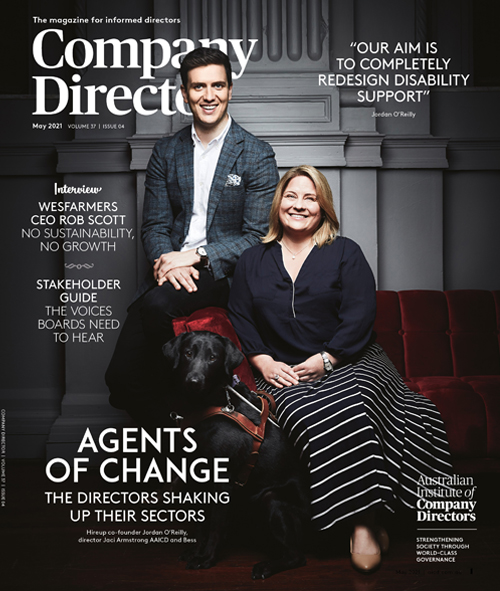Having proved their value as the guardians of public health during the COVID-19 pandemic, chief medical officers are now in demand in boardrooms around Australia.
In a post-pandemic world, chief medical officers (CMOs) are proving their value — becoming more visible and in- demand as many organisations move to shore up strategy and risk management in the health space by appointing their own CMOs.
The Woolworths Group appointed Dr Rob McCartney to the newly created position of CMO in August 2020 to help keep staff and customers safe during a year that saw the supermarket chain adopt a range of other health- supportive measures, including sanitation stations, perspex shields and team temperature checks. The appointment was a first for an Australian retailer and was designed to provide Woolworths with expert medical advice to help shape policies that will ensure the ongoing safety of teams and customers as the nation continues to live with the COVID-19 pandemic.
McCartney said the role of the CMO is increasingly important as mental health issues have increased in the pandemic and are the largest single cause of disability in Australia, accounting for over a quarter of the burden. “Decisive leadership is essential and directors are well- advised to devote appropriate resources to ensuring their employees’ — and their own — psychological wellbeing,” said McCartney, who has more than 20 years’ experience in occupational medicine.
He said in any given year, one in five Australians will experience a mental illness such as depressive, anxiety and/ or substance use disorder, and that about 90 per cent of workers’ compensation claims involving a mental health condition were linked to such stress.
“We know work-related stress is caused by certain occupational hazards such as poor support and workplace relationships, low role clarity, poor organisational change management, perceived organisational injustice, remote or isolated work, and excessively high or low job demands,” he said. “And we know protracted stress can increase the risk of anxiety and depression.”
As CMO, McCartney provides direct input into the Woolworths board and its relevant sub-committees, as well as the group executive committee, with the aim of delivering significant risk mitigation and helping future- proof the company’s profitability and growth. Other responsibilities include engagement with regulatory authorities and state and federal health departments, and the development of ongoing educational materials for all team members.
McCartney said work-related psychological injuries are increasing in number and cost across most industry groups and protracted musculoskeletal injuries — for example, lower back or neck pain — usually have a contributing mental health component. “The associated human cost and diminished productivity from insurance costs, unplanned absences, staff turnover, withdrawal, presenteeism and diminished work quality necessitates evidence-based risk management,” he said.
Director obligations
When it comes to risk management, McCartney said work, health and safety (WHS) regulations oblige directors to ensure the mental health and safety of their workers, as far as reasonably practicable. Psychological hazards can be managed using the same risk-management process applied to physical hazards. “Early intervention is essential where a manager has identified a psychological risk or stressed employee, as such primary prevention is the most cost- effective,” he said.
Organisations within the healthcare, health insurance and government sectors have traditionally always had CMOs, but now a broader range of businesses are seeking them out, says Perth-based Dr Penelope (Nell) Gillett . Gillett commenced as Rio Tinto’s CMO in March, after previous roles with South32, Wesfarmers Chemicals, Energy & Fertilisers, and global oil/gas explorer INPEX.
“With the rise of a global pandemic, what that has really done is expose other industries to the absence of specialist health expertise within their organisation,” said Gillett, noting that job opportunities for CMOs have expanded in the past six months. Some have likened the hiring flurry to that which occurred 20 years ago, when companies sought chief information officers to handle their IT strategies.
“The health of your people directly relates to the health of your business,” said Gillett. “Until we get to a world where machines are doing everything, people are your greatest asset — so optimising their health and productivity is an amazing way to have great return on your investment.”
Gillett noted the trend is cyclical — in the 1970s–’80s, many organisations had CMOs, but “got rid of them, thinking they’re just an expense that didn’t add value”. She noted that CMOs were then replaced with well-marked but “quite gimmicky” initiatives that didn’t really provide any meaningful value-add to the overall strategy of an organisation.
“I look at the workplace massages or fruit boxes, or any of those other things that are a cheap, efficient way to tick the health and wellbeing box,” said Gillett. “They don’t actually hit that dial because they’re not engaging at the right level of the organisation to influence and demonstrate the benefit of having specialist expertise within the business. From a board perspective, having a CMO can be important because board members are ultimately accountable for the management of risk within their business. By having a blind spot to the significance of health within the business, particularly fatal health risk, it’s leaving them really exposed.”
Latest news
Already a member?
Login to view this content



